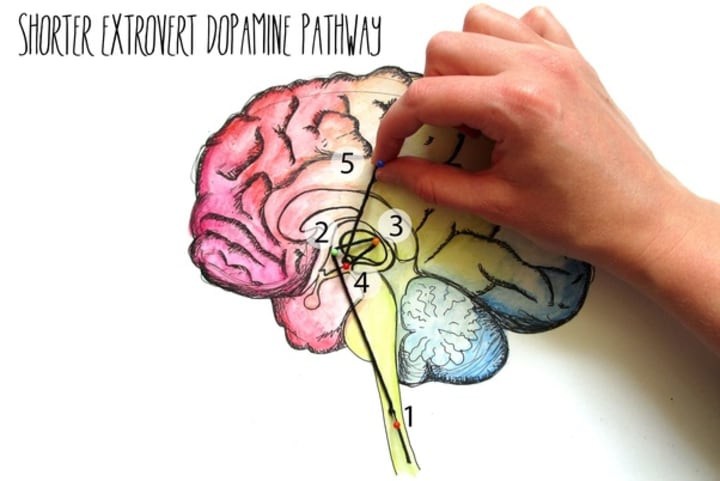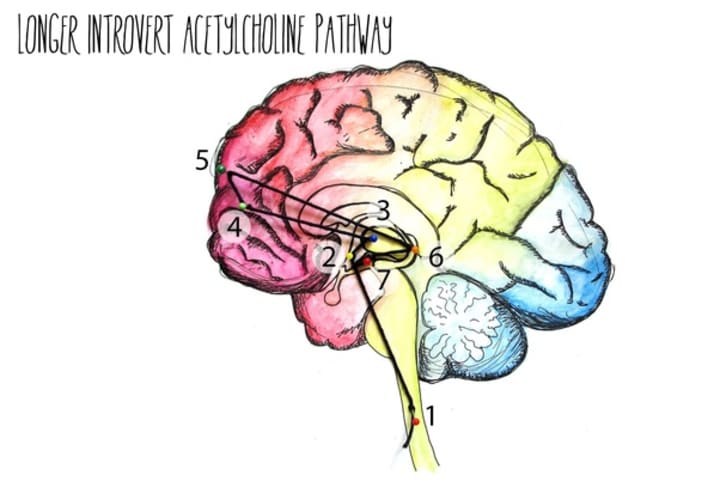The Neurological Differences Between Introverts and Extroverts
(and How to Know If You’re an Introvert)

Are there neurological differences between introverts and extroverts?
Absolutely.
Introverts utilize a different dominant neurotransmitter in the brain than extroverts do.
Neurotransmitters are basically chemicals that signal activity in the brain.
What’s even more interesting is that the actual blood flow in an introvert’s brain follows a completely different pathway than the blood flow in an extrovert’s brain.
Extroverts use a lot of dopamine, which is one type of neurotransmitter.
You might have heard of dopamine production in the context of drug or alcohol use, which does occur but more generally speaking, dopamine is associated with any type of sensory pleasure or stimulus.
Since extroverts have a higher dopamine threshold, they require more of it in order to trigger that “feel good” sensation. This is just another way of saying they require more external stimulation or activity to get their pleasure fix.

The blood flow in an extrovert’s brain follows a shorter pathway that hits the areas of the brain associated with external stimuli. This pathway is fueled by dopamine. Probably not a coincidence.
Introverts, on the other hand, use a longer, more complex blood flow pathway in their brains.
This pathway utilizes a different neurotransmitter, acetylcholine. Acetylcholine is like dopamine’s alter ego. Instead of external stimulation, acetylcholine triggers internal stimulation and energy conservation.
Tapping into internal activities such as intense mental concentration, long-term memory and REM sleep is how introverts have their blood flow pathways in their brain humming along nicely, keeping them feeling good.

Photos by Marielle Coppes[1].
Introverts have a lower dopamine threshold than extroverts.
This means that if they engage in activities that provide too much external stimuli, instead of feeling good, they feel overwhelmed.
It’s almost as if they are having to use a foreign brain pathway that they’re not used to, which is somewhat true.
These neurological differences can actually be explained by genetics and are the reason for different social tendencies between introverts and extroverts.
This is something I learned from reading The Introvert Advantage, which is a book I highly recommend for introverts.
How do you know if you’re an introvert?
If you’re quiet or shy, then you’re an introvert, right?
Not necessarily.

Here are four surefire ways to know if you’re an introvert:
1. Introverts are drawn to activities that most people would consider “low-key.”
This is probably the best way to determine whether you’re an introvert because introverts are natural energy conservers. Think about the things that energize you vs. the things that drain the life out of you.
Some of my favorite things to do are watch major golf tournaments on TV, sit in a coffee shop by myself and write, and go out to a nice dinner with my wife.
Not the most exciting life in the world, but I wouldn’t have it any other way.
Extroverts, on the other hand, want to jump out of planes or go party with thousands of other people in Times Square. They can’t sit still and always want to be doing stuff and engaging with other people.
The explanation for this difference, as I mentioned earlier, is that our brains are wired differently.
2. Introverts are like a rechargeable battery.
If they do engage in highly stimulating activities such as large parties or events, introverts will need sufficient down time to recover and recharge.
When I have a busy weekend filled with social obligations, even if they are with people I like, I need a few days afterwards to do nothing or I start to get cranky.
Extroverts are more like an AC power source: always on and ready to go.
3. Introverts prefer a few deep interactions to many shallow ones.
Introverts are often perceived as quiet or shy because the way they process information and interact with the world often brings out a tendency to stay quiet or keep to themselves in public settings.
But make no mistake, if you hit the right nerve or trigger the right topic, then introverts will unleash a depth of knowledge and insight like you’ve never seen. So it’s not as simple of quiet vs. talkative.
Most of the time, I’m quiet and reserved. But when it’s just me and my wife talking about something I care about, I won’t shut up.
The same is true for events and experiences.
If I went to a NASCAR race, I’d feel totally out of place and overwhelmed by the crowds and noise because it’s not something I enjoy.
But in 2014, I went to the World Cup in Brazil to watch my favorite sports team, USA mens soccer. It was super loud and crowded… and I had a blast. I even made conversation with random drunk fans.
The difference is that I love soccer, so I found a lot of enjoyment and value in that particular experience.
4. Finally, introverts are selective listeners and very selective speakers.
We usually don’t volunteer to speak up unless we are called upon and even then, we don’t like talking unless we have something meaningful to say.
This behavior is most common in the classroom and in the workplace, but it can apply in social situations as well. If someone is talking about something I’m not interested in, it’s really easy for me to zone out.
As you can see, there’s a lot more to introversion than just being quiet or shy.
Hopefully, this will help you to understand your personality (and those of people around you) a little better and truly determine whether you’re an introvert.
If you enjoyed this post, here are three more things you might like:
Trying Not to Suck at Life: My weekly newsletter with specific and actionable tips and tools to help you improve your health, wealth, productivity, and happiness
The Effort Matrix: My productivity book that centers on aligning your focus and efforts with your highest life priorities to maximize happiness
Your Personal Health Score: My book on how to measure your physical health from a score of 0–100, an ultimate guide to health and fitness for data enthusiasts
About the Creator
Alykhan Gulamali
Author of Calorie Counting Made Easy and The Effort Matrix. Over 3M views in health, finance, and productivity. Trying not to suck at life.






Comments
There are no comments for this story
Be the first to respond and start the conversation.